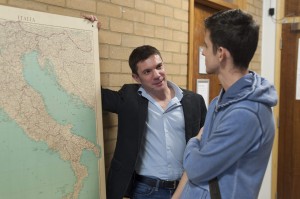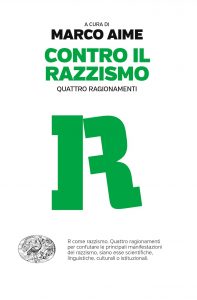
Dr Federico Faloppa, Assistant Professor of Italian at the University of Reading.
On July 7th, Emmanuel Chidi Namdi, a Nigerian refugee living with his wife in the town of Fermo, in central Italy, died of injuries he sustained when a local man, Amedeo Mancini, who had reportedly been racially abusing Namdi’s wife, attacked him. Amedeo Mancini, 39, allegedly referred to the 24-year-old woman as a “monkey”, and attacked Namdi when he attempted to defend her. Namdi – who fled the terrorist group Boko Haram with his wife, suffering the death of his son while crossing Lybia – fell into a coma and was pronounced dead a few hours later. Despite the Italian media’s efforts to de-emphasise Mancini’s extremist opinions, this was a racist attack, and a racist assassination.

“Contro il razzismo” (Einaudi 2016), the anti-racist manifesto that Federico has recently co-authored together with anthropologist Marco Aime, geneticist Guido Barbujani, and sociologist Clelia Bartoli. The authors will be on tour for a long seires of public talks and presentations next Autumn in Italy.
The next day, Dr Federico Faloppa, Assistant Professor of Italian in the Department of Modern Languages and European Studies at the University of Reading, published an open letter to the President of the Italian Chamber of Deputies (Camera dei Deputati), MP Laura Boldrini, to call for a national campaign against racism and hate speech, drawing on the voluntarily work of scholars, teachers, journalists, activists. For more than fifteen years Dr Faloppa has worked to deconstruct and delegitimise racist discourse, organising anti-racist campaigns and activities in Italy. In a few hours his open letter went viral and become a petition which, thanks to Italian journalists Barbara Bonomi Romagnoli and Daniele Barbieri, collected the signatures of some of the most prominent Italian anti-racism campaigners, eventually reaching President Laura Boldrini’s staff.
A few days later, President Boldrini replied to Dr Faloppa, thanking him and the other supporters for their letter and their offer to contribute to a national campaign coordinated by her and her members of staff. In her reply, President Boldrini also mentioned the recently formed Parliamentary Commission against racism, xenophobia an hate speech that she chairs, and has named after the British MP Jo Cox, murdered by an extremist on June 16th in Leeds. Expressing her hope that Dr Faloppa’s initiatives can join the activities coordinated by the Commission, President Boldrini expressed interest in future collaborations on these important matters.

At the University of Reading, Dr Faloppa teaches courses on subjects including “Language and Power” and “Intellectuals and Society in Modern Italy“
Dr Faloppa’s efforts make clear that collaborations between scholars, activists and policy makers is the best option available for a sound, long-term campaign to culturally and politically contrast racism and xenophobia in Italy and beyond.
To find out more about Dr Faloppa’s work and how you can get involved, and to learn about the engagement and outreach of other scholars in the Department of Modern Languages and European Studies at the University of Reading, we invite you to check out the Reading Reacts section of our blog, to like us on Facebook, and to subscribe to our Twitter feed.
If you would like to receive regular updates from our blog, with the latest news about languages at Reading, please enter your email address below:
[subscribe2]

